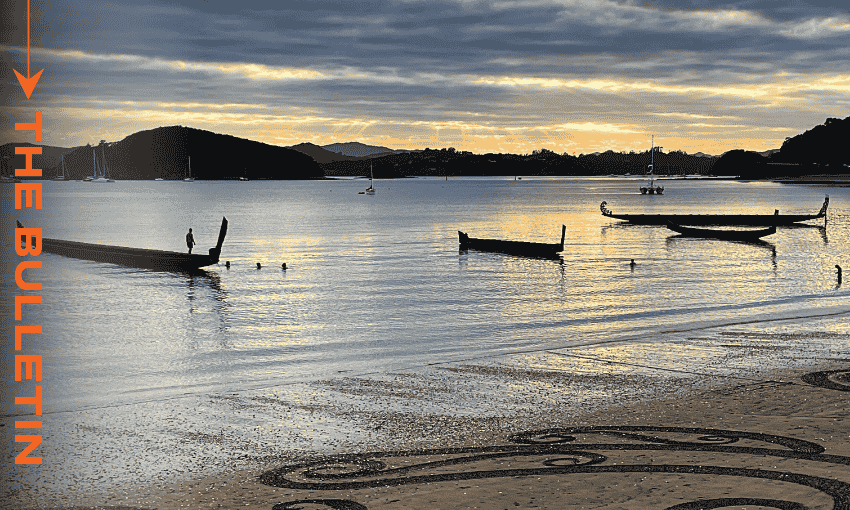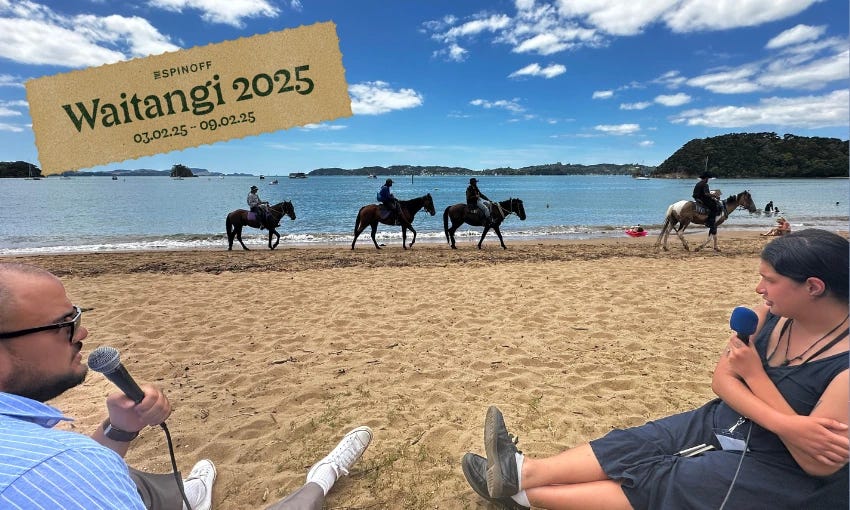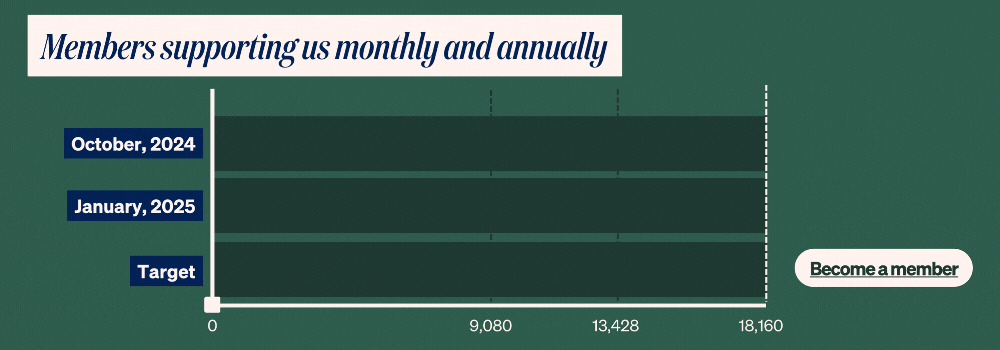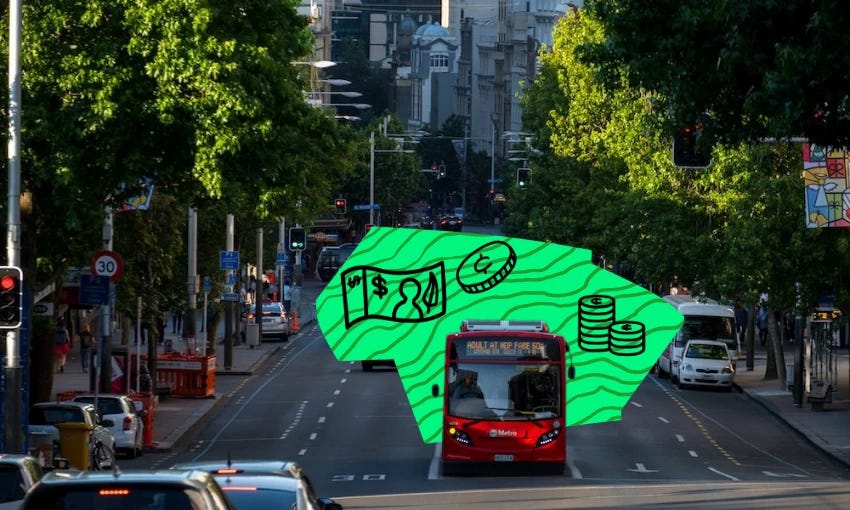What happened at Waitangi and why it might be different next year
Political aspects of Waitangi week may be moved back to Te Tii Marae in 2026
Mōrena, and welcome to The Bulletin for Friday, February 7.
In today’s edition: youth unemployment rate highest in over a decade; new candidate for Auckland’s mayoral race; the most important figure in New Zealand technology you’ve never heard of; but first, mana motuhake and tino rangatiratanga take centre stage at Waitangi.
Celebration and on-the-ground politics
For the third year in a row, I have returned from Waitangi full of food and deep regrets about not shoving down one more pottle of raw fish and one more hunk of fry bread. It’s always interesting to actually be there in the warm embrace of Northland’s manaakitanga, watching kids jump off the bridge as golf carts cruise by, traffic managed via waves, east coast/Northland waves and friendly yelling, and then read the coverage. Inevitably, the focus is on the politicians, and in the wake of discord caused by the Treaty Principles Bill, “a divided nation” and an “overshadowing” of the day.
As The Spinoff’s Lyric Waiwiri-Smith observes in this morning’s Waitangi Day wrap-up penned by her and The Spinoff’s Ātea editor, Liam Rātana, “the time given for politicians to hold their forums and speak their piece is minuscule and, in many ways, insignificant in comparison to the six days of celebrations,” and “Sure, there were plenty of demonstrations, but they weren’t the focal point.”
Waitangi 2025: A day of kōrero, kaupapa and kotahitanga
As Rātana reports, in a break from previous years, two forums were running in parallel alongside the main programme at Te Whare Rūnanga, or the upper Treaty Grounds – one at Te Tii Marae and one at Te Korowai ō Maikuku (the boat house). The latter was organised by Eru Kapa-Kingi and other key members of the Toitū Te Tiriti group who organised last November’s hīkoi. Waiwiri-Smith observes that “one belief was virtually universal within the tent: existing as Māori is inherently political.”
Circus or supremely organised venting of passions?
Carefully quibbling with Shane Jones’s assessment of the pōwhiri being turned into “a circus” by the protestors who turned their backs on National’s Tama Potaka and the mic being taken away from Act’s David Seymour, The Herald’s Simon Wilson writes (paywalled), “But watching from the outside, what I see is a highly ritualised and highly passionate affair, where tikanga obliges everyone involved to vent their passions within prescribed limits. It’s supremely angry, supremely organised, non-violent protest. In my view, that’s pretty magnificent.”
RNZ’s Jo Moir has a good piece outlining some of the underlying tensions, frustrations and last-minute decisions that led to events on Wednesday. RNZ’s Ella Stewart has a nuanced and well-researched piece on the protestors who turned their backs on the politicians.
As Waiwiri-Smith wrote yesterday, the back turning at the pōwhiri eradicated any “doubt about the distance between the coalition government and Māori”. The pōwhiri was shorter than usual and, aside from Seymour’s half speech, didn’t have the same oratorial crackle as last year. As Waiwiri-Smith writes, “a short and largely uneventful event is likely what the coalition was also hoping for.”
Crown accused of filing ‘for divorce’ while Māori remained ‘blissfully unaware’
The dawn service marks the formalities of Waitangi Day itself, as distinct from the day before when the pōwhiri for the politicians is held. It’s a reverent affair and probably one of the few public occasions in a country where the majority identify as “non-religious”, where religious leaders, prayer, and spirituality take centre stage. Methodist leader Te Aroha Rountree had the cut-through of the morning, likening the Crown-Māori relationship to a marriage, accusing the Crown of filing “for divorce” while Māori remained "blissfully unaware”.
Change ahead for next year?
Next year is an election year, and while we can safely bet on the Treaty Principles bill being dead by then, capital P politics will no doubt rear its head at Waitangi in 2026. As Newsroom’s Laura Walters reports, most of the political aspects of the week may be moved back to Te Tii Marae. While the treaty was signed at Te Whare Rūnanga at the upper Treaty grounds, as Walters explains, Te Tii Marae is where the discussions and debate were held in 1840. The pōwhiri was moved in 2018, “in part to remove some of the charged political debate from the proceedings and have MPs present themselves as united parliamentarians rather than party politicians,” Walters writes. Te Tii has also been undergoing a refurbishment and reopened this week.
What didn’t happen at Waitangi?
Prime minister Christoper Luxon wasn’t at Waitangi but in Akaroa at Ōnuku marae, hosted by Ngāi Tahu. Pro-Palestine protesters made an appearance. As RNZ’s Russell Palmer reports, Luxon’s speech echoed his State of the Nation address, focusing on economic growth and what could be achieved when iwi and government cooperate. In his address, Ngāi Tahu kaiwhakahaere Justin Tipa said, “A National Party that fails to take leadership on matters of fundamental importance to the identity of our nation is not worthy of its own name ... we do need growth, we do need investment, we should be ambitious. Ngāi Tahu wants those things too. But simply going for growth and liberalising the economy isn't going to cut it.”
Gone by Lunchtime Waitangi special
Recorded on the sandy shores of the mighty North, guest hosts Liam Rātana and Lyric Waiwiri-Smith (along with regular producer Te Aihe Butler) discuss the problem of David Seymour, Tama Potaka’s messy kūpapa-kaupapa wordplay, the (seemingly undercooked) te Tiriti Commission proposal, and what we’d like to see at Waitangi in 2026. Listen here or wherever you get your podcasts.
More Waitangi reading from The Spinoff
Ngāpuhi settlement stalemate: Why is the Crown funding an entity with no mandate? — Liam Rātana
What would migration look like if te Tiriti o Waitangi was honoured? — Eda Tang
An updated Te Tiriti reading (and watching and listening) guide
In case you missed it:
No prime minister, no problem: Māori prepare for big day at Waitangi
What did the Māori chiefs say before the signing of the Treaty of Waitangi in 1840?
We still need your help
Our extensive coverage of Waitangi 2025 – powered by the nearly 16,000 people who give to us on a monthly or annual basis or who have donated as a one-off – would have been unimaginable before so many of you met our honesty with your generosity after our open letter in November.
We still need 4,500 new members to join us this year to ensure our future so we can continue the comprehensive, rigorous and thoughtful coverage of the things that matter to our audiences.
Please, if you value comprehensive coverage of Waitangi and te Tiriti issues and are not a member yet, make this the week you sign up.
Youth unemployment hits ten-year high
As the Herald’s Liam Dann writes (paywalled), New Zealand’s young people are bearing the brunt of the economic downturn.
Dann reports on data highlighted by ASB economist Mark Smith, which shows that the unemployment rate for those aged 15-19 hit 23%, the highest in over a decade.
“More than 70% of the 32,000 net jobs lost over 2024 were for those aged 15 to 24,” Smith said.
BNZ head of research Stephen Toplis said the rate would be even higher if it weren’t for the fact that youth participation is dropping rapidly. As Topliss notes, young people tend to be in more marginal employment and can return to school or pursue higher education. “The drop in participation for this age group suggests many may be doing this,” Toplis said.
The overall unemployment rate rose to 5.1% in the last quarter of 2024, in line with Reserve Bank (RBNZ) forecasts. As interest.co.nz’s Dan Brunskill reports, a Stats NZ spokesperson said the annual drop in employment was the largest since 2009.
As economists noted, the RBNZ has stated that a 50 basis-point Official Cash Rate (OCR) cut will be the base case for its policy review later this month. The next OCR announcement and Monetary Policy Statement is on February 19.
Auckland councillor wants to be the first Māori mayor of Auckland
As the Herald’s Joseph Los'e reports, Auckland councillor Kerrin Leoni has put her hand up to run for mayor in the super city and wants to be the first Māori mayor of Tāmaki Makaurau.
“Aucklanders I’ve spoken to want change – a younger woman as mayor who will bring fresh ideas to Auckland Council and our Super City. In 160 years there have only been two women mayors. There has never been a woman mayor for the Super City,” Leoni told the Herald.
Toby Manhire has a full rundown on everything we know about the mayoral races across the country on The Spinoff later this morning.
Join us live in 2025
We have four fantastic live events in 2025. Join us in Auckland and Wellington for The Spinoff Live!
Auckland at Q Theatre: Bryn & Ku’s Singles Club Party, February 13 and Gone by Lunchtime Live, April 9.
Wellington at the Hannah Playhouse: The Fold Live, February 20 and The Spinoff Book Club, March 13.
The startup savant behind Trade Me and Xero
Described by The Spinoff’s Duncan Greive as “the most important figure in New Zealand technology you’ve never heard of”, Rowan Simpson has had a guiding hand in Aotearoa’s most successful tech companies. His new book “How to be Wrong: a crash course in startup success” shares the close calls and near misses that happened behind the scenes at Trade Me, Xero and Vend. He talks to Bernard Hickey in the latest epsiode of When the Facts Change about his journey through tech, the keys to startup success, and whether he ought to have just bought into residential property instead.
Click and Collect
Cook Islands prime minister is expected to sign a major partnership deal with China in the next few days.
Chinese embassy in Apia meets with villagers in Samoa whose livelihoods have been impacted following the sinking of the New Zealand navy vessel HMNZ Manawanui.
Guy Fiti Sinclair, an associate professor and the associate dean (Pacific) at Auckland Law School, has more analysis on the danger of turning Pacific countries into political footballs in Newsroom this morning.
Contact Energy undeterred by a negative report from the Commerce Commission about its $1.9 billion takeover of Manawa Energy.
Bratfall: a ticketing glitch frustrated thousands of Laneway ticketholders at Western Springs yesterday. They did not love it. No doubt Charli xcx’s set made up for it.
Duncan Greive dives into the decision to ban under-18s from attending this year’s festival.
Revered writer, former Poet Laureate and environmental campaigner Brian Turner died on Wednesday, aged 80. His brother, former New Zealand cricket captain Glenn Turner, described him as “a gentle and philosophical person” who had conquered most of the country's peaks.
Inside Trump’s hastily written proposal to ‘own’ Gaza (New York Times - gift link)
Shanti Mathias asks whether public transport fare increases in Auckland are the start of a nationwide trend. Hera Lindsay Bird waxes wisely and lyrically, advising someone whose child has terrible taste in music. The Spinoff Review of Books with the books (and one captivating women’s mag story) we actually read over summer. KnowYourStuffNZ’s general manager, Casey Spearin, shares a guide to safe drug taking.
That’s it for today, thanks for reading.
Want to get in touch? Join the conversation in the Substack comments section below or via email at thebulletin@thespinoff.co.nz if you have any feedback on today’s top stories (or anything else in the news).
If you liked what you read today, share The Bulletin with friends, family and colleagues.

















